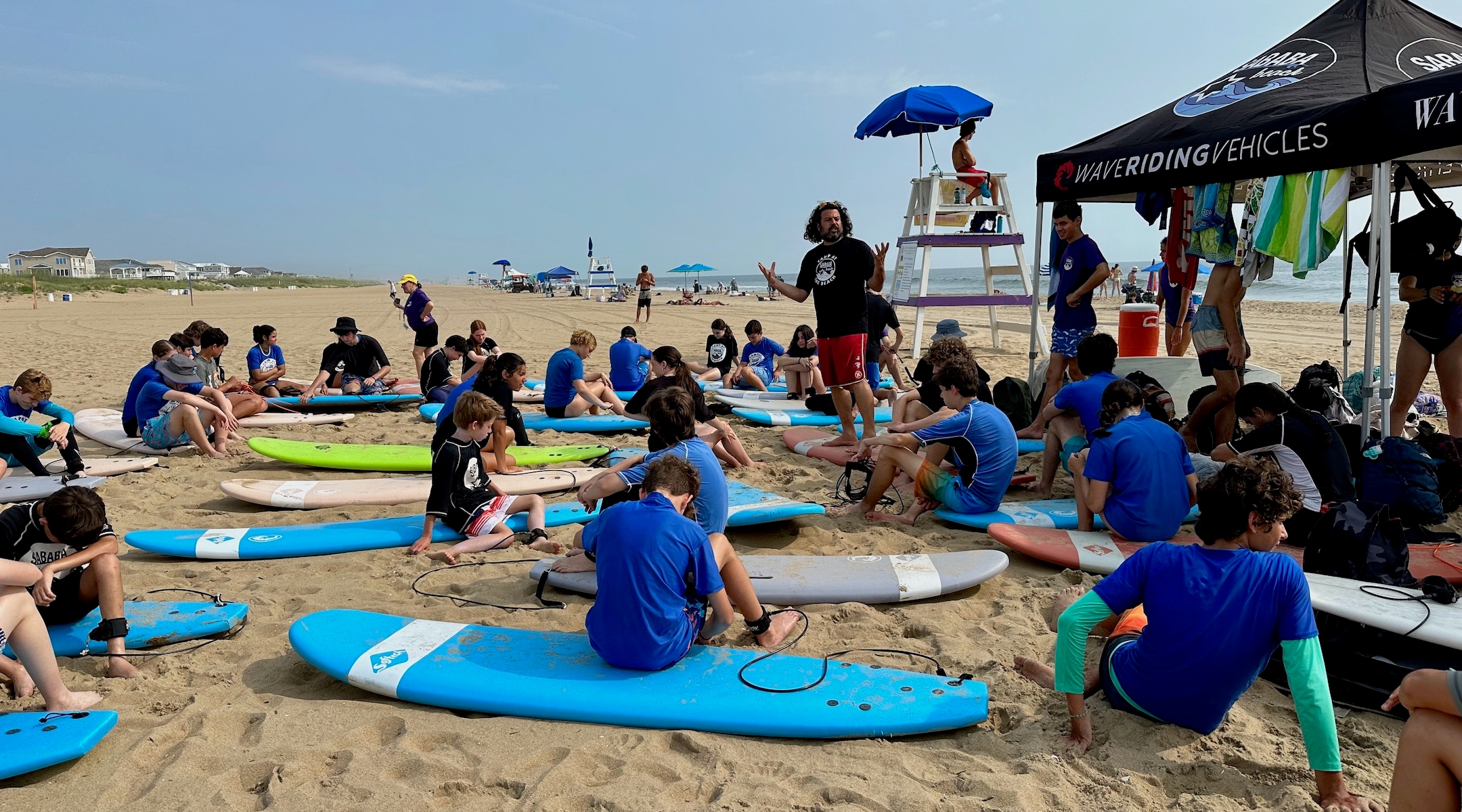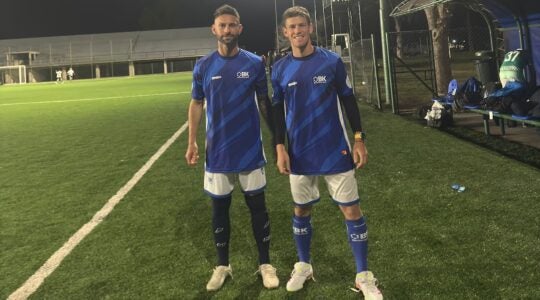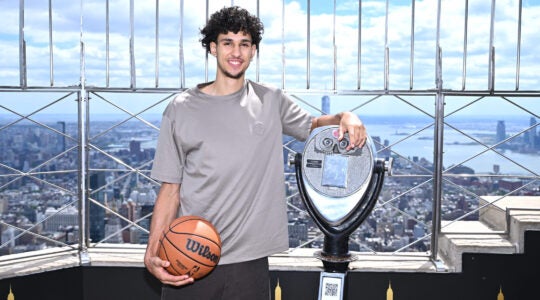VIRGINIA BEACH, Va. (JTA) — On a recent morning at Sandbridge Beach, about six miles down the coast from Virginia Beach’s famous boardwalk, an unexpected fog disrupted beachgoers’ otherwise picturesque summer setting.
The fog was so thick that even the water became invisible, and everyone was forced out of the water. Most swimmers and surfers retreated to their towels for a break.
But one group returned to their tent and, after a quick snack and a new layer of sunscreen, formed a circle. They began by singing the Jewish prayer “Mah Tovu”, mashed up with the hymn “Sanctuary.” Then after a brief introduction from camp director Danny Mishkin, who explained the concept of “b’tselem elohim,” the idea that people are created in God’s image, campers took turns sharing what gifts they bring to their community.
Such is the dual mission of Sababa Beachaway, a Jewish overnight camp in Virginia Beach that specializes in ocean education and exploration through a Jewish lens. The camp offers four focus areas — surfing, sailing, scuba diving and an education track called “ocean discovery” — on top of typical camp activities and Jewish programming and prayer.
“We teach a more spiritual style of Jewish learning and Jewish engagement,” Mishkin told the Jewish Telegraphic Agency. Mishkin explained that the camp’s approach to spirituality enhances campers’ connection to both their Judaism and to the ocean.
“It really does flow back and forth,” he went on. “It’s not like, ‘Oh, here’s the Jewish time.’ We’ll actually get to the beach, do a prayer about making the beach a sanctuary. So that they’re aware to nature, they’re aware to being fully present. It enhances their specialty, but also the specialties are very in-the-moment specialties and have a little bit of adrenaline rush to them. And that enhances our Jewish programming. They’re a little more open to a more spiritual life when you take them to the beach, which is a very innately spiritual place.”
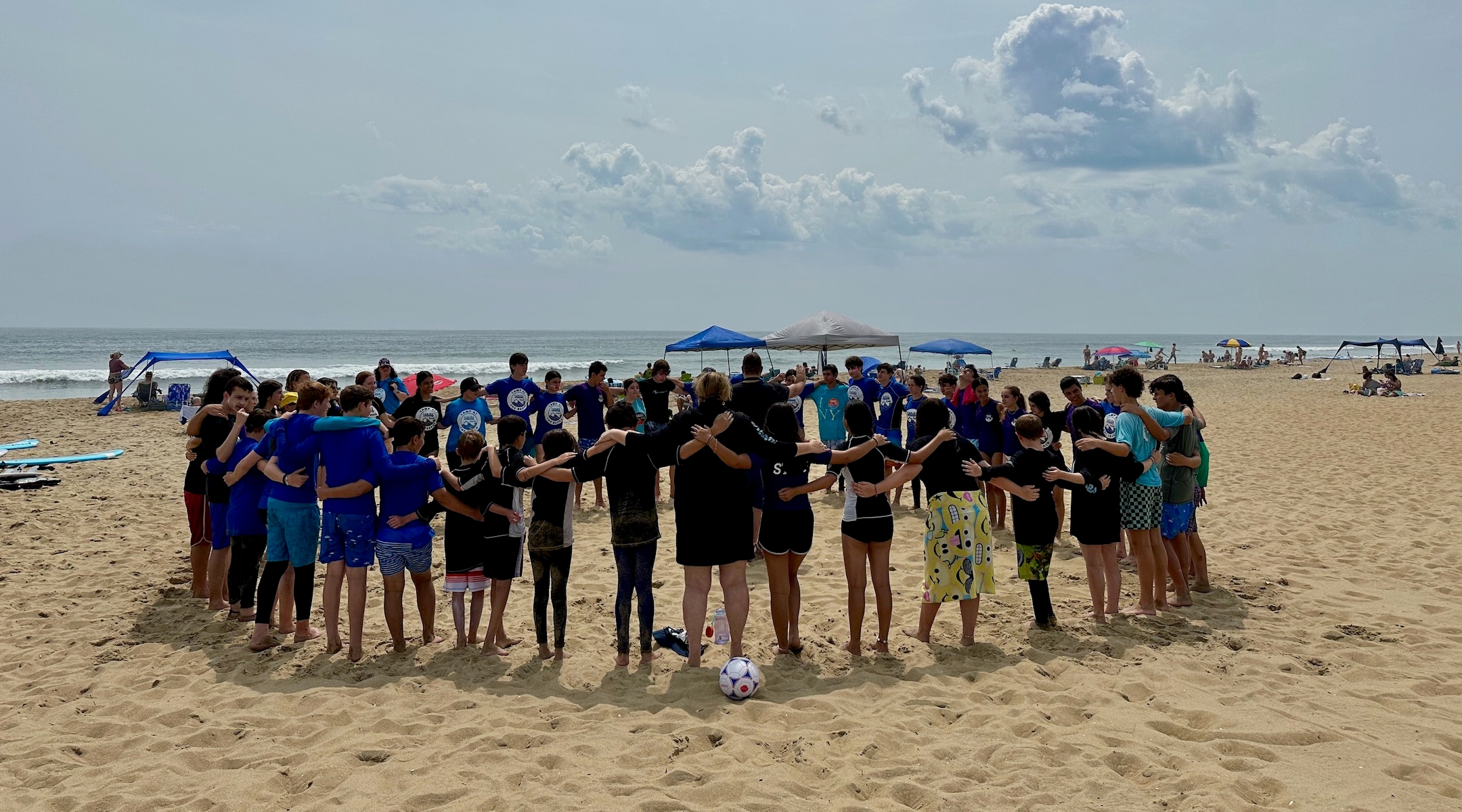
Sababa Beachaway campers sing “Mah Tovu” at Sandbridge Beach in Virginia Beach, Va. (Jacob Gurvis)
Maya Cohen, 16, said being at Sababa has helped her connect spiritually, which wasn’t as easy for her before camp. “I like the community. It feels like a second home to me,” she said.
Sababa just wrapped up its fifth summer, which consisted of three two-week sessions for campers ranging from 9 to 17 years old. Though the camp has experienced considerable growth — from 80 sessions sold its first summer to 230 this year — it’s been anything but smooth sailing.
Mishkin and his co-founder and co-director Lynn Lancaster created a day camp in New York in 2015, with help from a Jewish grant for out-of-the-box summer programs for teens. Both directors are synagogue veterans with a background in Jewish education and youth engagement.
Lancaster, a longtime sailor herself, said she and Mishkin chose to create a surfing program because it provided an opportunity that was not readily available to children in New York.
She also referenced “Race to Nowhere,” the 2010 documentary about the increasing burnout and depression children can experience in the face of mounting pressure to succeed at a young age. In other words, what better way to escape the pressures of school and college applications than to spend a summer at the beach?
Mishkin, who added that he sees Sababa as the place for “over-programmed kids,” has been surfing for around 20 years, since he took two lessons during his honeymoon in Hawaii and “became obsessed with it.”
After a few summers running the day camp, which started with only nine campers, Mishkin and Lancaster took the next step and launched an overnight camp in Virginia, with support from the Foundation for Jewish Camp’s incubator program. While some Jewish camps in California allow campers to specialize in surfing, Sababa may be the only Jewish camp primarily focused on the sport.
For the first two summers in 2018 and 2019, Sababa was based out of Old Dominion University in Norfolk. Then COVID hit. There was no camp in 2020, and in 2021, Sababa ran a scaled-back program in New York, where both directors live during the year.
Sababa then returned to Virginia last summer, moving to Virginia Wesleyan University, which Lancaster said has been the perfect spot. The campus features a swimming pool, climbing wall and sports fields. And the school accommodates Sababa’s need for a kosher kitchen, too.
“It’s been a nice, smooth five years. It was really easy-going,” Mishkin joked.
“What camp wouldn’t want to take a year off after two years of running? It was fabulous,” Lancaster added with a smile.
Starting last summer, Sababa became part of Commonpoint Queens, a social services organization in New York that runs local community programming and operates seven camps. A partner of New York’s UJA-Federation, Commonpoint’s camps are all Jewish and kosher or kosher-style, according to the group’s vice president of operations, Craig Lastres.
“It’s very difficult to survive as a mom-and-pop if you’re not attached to anything,” Lastres told JTA. Lastres said he tries to visit Sababa a few times each summer.
After navigating two COVID summers as an independent camp, Lancaster said being part of Commonpoint has been “a wonderful, wonderful thing for us.”
Since Sababa is not affiliated with a major Jewish denomination — and therefore is not connected to the Ramah or Reform camping networks — as an independent camp it did not receive the resources and support that come with being part of a camping movement, like help with fundraising, marketing, camp accreditation and so on.
Sababa’s campers represent a wide range of Jewish affiliation, from those who wrap tefillin and observe the summer’s fast days to those for whom “this is their Jewish connection,” Lancaster said. (There are also a few non-Jewish campers, drawn by the prospect of daily surfing.)
“I think as a camp and as a community, we are doing incredibly important work, as these kids are getting to know each other, they’re learning from each other’s Judaism,” she added.
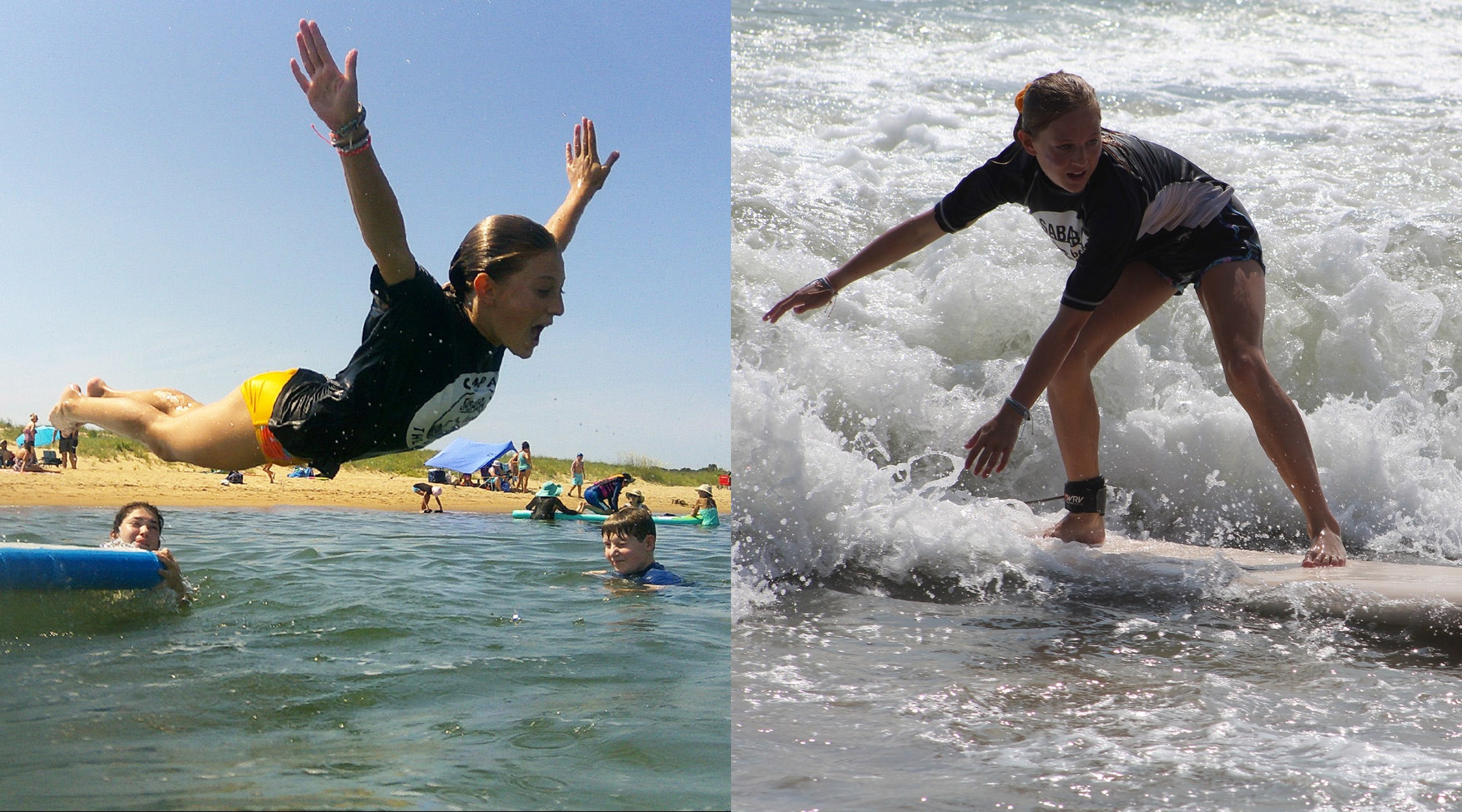
Campers surfing at Sababa Beachaway. (Courtesy of Sababa)
Campers also come from a variety of socioeconomic and national backgrounds, with kids coming “from Park Avenue to the park bench,” Lancaster said. And this summer, Sababa welcomed campers from as far away as Israel and Uruguay, as well as a staff member from Mexico City.
With its campus next door to Norfolk, home to NATO and the world’s largest naval base, Sababa also tries to tap into the local military community by offering scholarships for military children through the Jewish Board of Chaplains.
Lancaster said she appreciates being able to offer such an opportunity, especially for a community that is not often prioritized in Jewish spaces.
“If there are [military] service people that want to have those Jewish values that they’re not getting, it’s an interesting market we’re trying to tap into,” Lastres added.
At its inception, Sababa only offered surfing, before expanding to add its three other specialty areas. The camp brings in local companies for the sport instruction, which both directors hailed as central to the program’s success.
“One of the things that’s also helpful when you’re dealing with nature as such a big part of your program is having locals help run it because they know —” Mishkin began to explain, before Lancaster jumped in, finishing her colleague’s thought: “they know the beach, they know the tides, they know weather. Danny and I can read that in New York with perfect ease, but this is their world,” she said.
While most of the instructors aren’t Jewish, Lancaster and Mishkin said they are fully bought-in to Sababa’s focus on spirituality.
“I think the ocean and the water, the wonder, transcends a particular denomination,” said Lancaster.
“When they see us do our morning ritual at the beach,” Mishkin added, “the head surf instructor said, ‘When I heard you say that, I knew I was part of something special. I just knew that this was a different type of program.’”
The campers spend Monday through Friday mornings at their specialties, which run for a week at a time and are split into groups based on skill level. In the afternoons, it’s back to campus for more traditional camp programming — activities like art, soccer, photography and drama. “It’s a lot like running two camps,” Lancaster said.
Evenings feature Jewish programming, hikes, bonfires and other nature-forward experiences. Then on Shabbat, the camp has egalitarian services on Friday night — a portion of the service has music, while the main ma’ariv section does not — plus four service options on Saturdays, ranging from traditional prayer to options centered around meditation, nature and drama.
Caleb Weiss, 14, said he comes to Sababa for his friends and to spend every day at the beach. “I think it connects what I love and my religion, which is really neat,” he said.
Jill Weinstein, a therapist from Atlanta who has worked at Sababa for three summers, said she has witnessed firsthand how the camp has enhanced kids’ emotional intelligence — especially in the context of water sports, where they have no choice but to get back up when a wave knocks them down.
“It teaches a lot of these kids resiliency and grit,” she said. “It’s pretty amazing to see where they start at the beginning of the week and where they end, and just the accomplishment and just the smile on their face when they accomplish something.”
The idea that campers will take home the lessons they learn at Sababa is a key component of the camp’s mission. Mishkin explained that they often do check-ins with campers where they share their “Sababa level,” a 1-10 scale of how present one feels in that moment. Mishkin said he has heard multiple stories from parents whose kids have used that same language at home and at school.
Eight years after starting the day camp in Queens, Lancaster said she “never had any idea this could become a full-time gig.”
But looking out at the water, where her campers were fully engaged in their surf lessons, with counselors standing by to help and offer words of encouragement, not to mention Mishkin waist deep in the ocean offering help to a struggling surfer, Lancaster echoed the sense of wonder the camp aims to imbue in its participants.
“How do you not recognize that you’re part of something bigger than yourself when you’re out here?” she asked, not expecting an answer. “And to do that in a Jewish context is very, very powerful.”
JTA has documented Jewish history in real-time for over a century. Keep our journalism strong by joining us in supporting independent, award-winning reporting.
